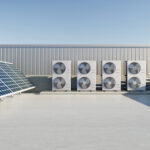What are key performance requirements for data centre roof specification?

Data centre roof systems have two specific key performance requirements; to ensure uninterrupted operation and protection of the valuable technology within the building. The emphasis for a data centre roof system is on functionality, cost, and speed of construction.
Anything that interrupts the operation of a data centre that works 24/7/365, is considered a risk. This is because operational downtime could affect the data centre’s revenue. It also means that businesses that rely on uninterrupted service may fail to reach their business objectives.
Flat and low-slope roofs are the most commonly used roof types for data centres. The build-up specification predominantly includes metal decks and single-ply or reinforced bituminous membranes, with mineral wool becoming the insulation material of choice because of its fire performance. The increased need to reduce environmental impact, especially carbon dioxide emissions, resulted in a proliferation of green roofs and solar panel roofs, but this is still a relatively atypical choice for a data centre.
The common characteristic across data centre roof types are the critical performance requirements:
- Robustness and longevity
- Weather protection
- Fire performance
- Roof access
We will consider these and what they mean for specification of the roof and cover boards in the roof build-up of data centres.
How can I increase the robustness and longevity of a data centre roof build-up.
Cover boards provide a strong, flat, and stable surface to which a waterproofing membrane can be adhered or mechanically fixed. The cover board removes any surface irregularities other substrates may have. The two most specified coverboards are cementitious and gypsum core cover boards with glass mat facers. The latter is increasing in popularity because of the lightweight and relative ease of installation.
High-performance DensDeck® Roof Boards are glass mat-faced gypsum core cover boards. The addition of glass mat facers promotes the homogenous spread of adhesives to ensure a strong bond with the roof membrane. Fibreglass mat facers also increase material compatibility by allowing a range of adhesives to be used if the waterproofing is to be adhered. The even surface forms a platform that helps protect the waterproofing membrane from accidental penetration such as, but not limited to dropped tools, sharp objects being trodden into the surface or other foot traffic related incidents. As a result, the maintenance requirements for the roof are potentially reduced, and its life cycle is extended.
Can DensDeck® Roof Board improve the weather protection performance of a data centre roof build-up?
In terms of roof weather resistance, there is a risk of wind uplift that could cause severe damage to the roof of a data centre. We have already touched upon the fact the cover boards act as substrates and can improve the performance of the installation of a roof membrane. This is true of both adhered and part-adhered roof membranes where DensDeck® Roof Board enhances the strength of the bond with the membrane and improves wind uplift resistance of the roof build-up. The same applies to mechanically fixed membranes because there it provides a stable platform for the fasteners, as long as the recommended fastener pattern is adhered to. The DensDeck® Roof Board can help absorb differential movement caused by wind uplift, protecting the waterproofing membrane and the whole roof system.
What is the impact of DensDeck® Roof Boards specification on roof fire performance
In relation to roof fire performance, the roof build-up specification has seen a considerable shift in recent years. This is the result of unfortunate high-profile fires in buildings across the world. Roof specification has seen a change to ensure the best possible fire rating.
DensDeck® Roof Boards, when installed as cover boards over the insulation layer, can help improve the overall fire resistance of the roof system from external sources. When installed over the roof deck as roof boards, they can help slow the spread of internal fires.
DensDeck® Roof Boards are classified as A1 in accordance with EN 13501-1 and non-combustible as described and tested in accordance with ASTM E136. The cover board increased roof build-up fire performance in various data centre roof build-ups, such as the Amazon data centre in Zaragoza.
There are currently over 180,000 roofing assemblies that use DensDeck® Roof Boards as a roof board and are class 1 fire rated by Factory Mutual (FM). As of May 4th, 2022, there are 336,060 A-rated assemblies that use a DensDeck® Roof Board in a cover board application in FM’s RoofNav database.
How important is roof access to data centre operation?
Data centre roofs tend to house many building services that are an essential part of data centre operation. Roof access is critical to maintaining the functional infrastructure around the clock. Cover boards help protect the insulation layer from compression that could compromise its performance and the membranes from punctures caused by accidentally dropped tools, sharp objects being trodden into the surface or other foot traffic-related incidents. Cover boards also help protect the roof membrane from the impact of maintenance footfall.
Contact us to find out more about the benefits of DensDeck® Roof Boards for your data centre roof project or a mission critical roof project.
Contact Us
Start your project or simply get specification advice by dropping us a message.
One of our team will be in touch as soon as possible.